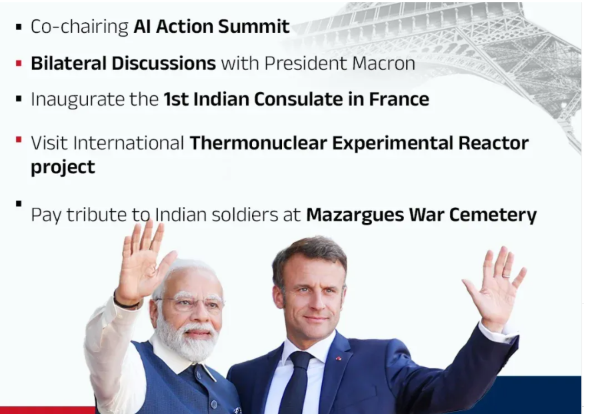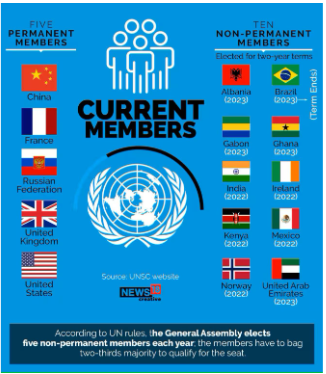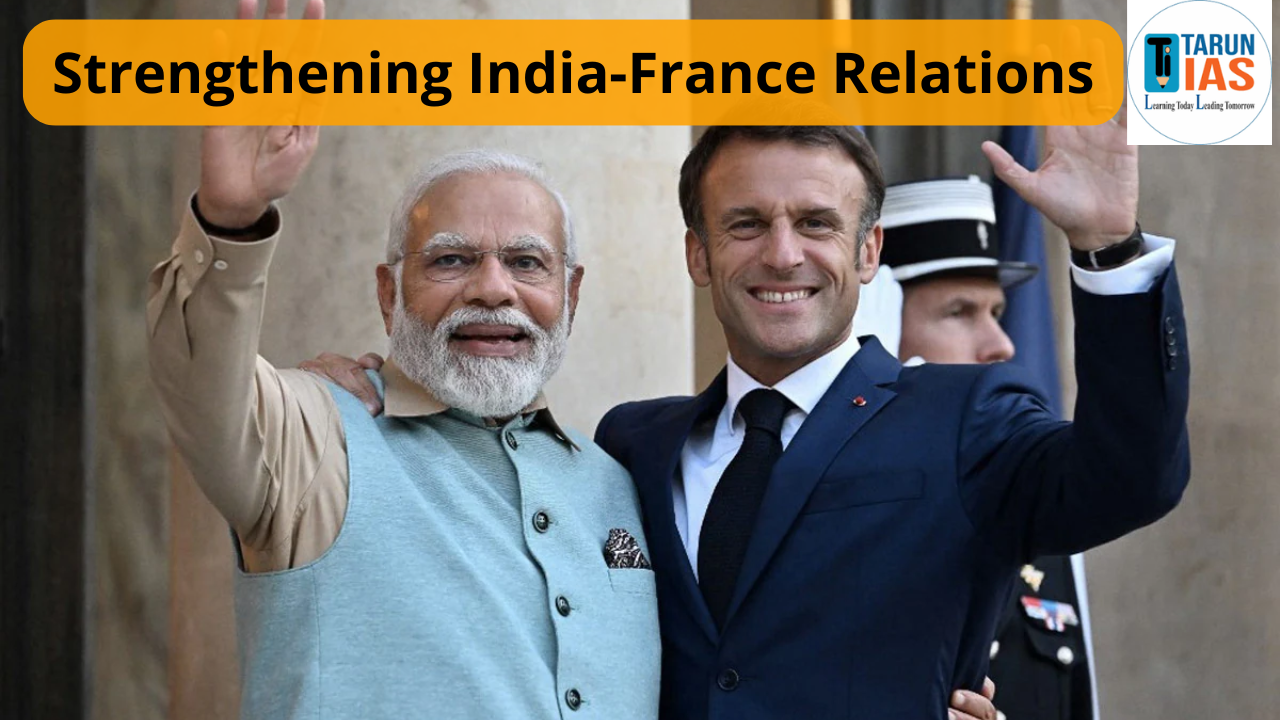Strengthening India-France Relations Introduction
- India and France share a long-standing and evolving relationship, marked by significant collaboration in various fields, from defense and technology to climate action and economic ties.
- Prime Minister Narendra Modi’s recent visit to France from February 10 to 12, 2025, has added another milestone to this enduring partnership.
- This visit was aimed at enhancing bilateral ties, furthering strategic collaboration, and exploring new avenues for cooperation.
Key Highlights of the PM Modi’s Visit to France
During his visit, PM Modi co-chaired the AI Action Summit with French President Emmanuel Macron, and participated in bilateral talks that further cemented the strategic partnership between the two countries. Here are the key outcomes:
- AI Declaration – India and France pledged to deepen collaboration in the development and application of Artificial Intelligence (AI), with an emphasis on ethical, responsible AI.
- Support for Indian Startups – France agreed to host 10 Indian startups at its prestigious Station F incubator, aimed at fostering entrepreneurial growth and collaboration.
- Advanced Nuclear Technology Collaboration – India and France signed a Declaration of Intent on Small Modular Reactors (SMRs) and renewed their cooperation in nuclear energy, reinforcing their commitment to jointly explore advanced nuclear technologies.
- Triangular Development Cooperation – A joint declaration was made to collaborate on sustainable development projects in the Indo-Pacific region, further expanding India-France influence on global development.
- Launch of India-France Year of Innovation 2026 – The official logo for this initiative was unveiled, symbolizing a shared commitment to fostering innovation and advancing scientific cooperation between the two nations.
- Indo-French Center for Digital Sciences – A Letter of Intent was signed between India’s Department of Science and Technology (DST) and France’s INRIA to set up a dedicated center for digital sciences, focusing on joint research and technological advancements.
- Consulate Inauguration in Marseille – PM Modi inaugurated India’s new consulate in Marseille, highlighting the growing diplomatic and people-to-people ties between the two nations.
- Environmental Partnership – A new declaration between the Ministry of Environment, Forest, and Climate Change (India) and France’s Ministry for Ecological Transition promises increased cooperation on biodiversity, climate action, and sustainable development initiatives.
A Historical Perspective: India-France Relations
- India and France have maintained warm relations ever since India gained independence, with bilateral ties developing in key areas such as defense, space, and nuclear cooperation.
- Post-Independence Engagements: From the 1960s onwards, France contributed significantly to India’s defense capabilities, providing aircraft and helicopters, such as the Mystere and Mirage 2000. France also supported India’s space ambitions, including the establishment of the Sriharikota launch site.
- Nuclear Cooperation: In the 1980s, when the US backed out from supplying nuclear fuel to India’s Tarapur plant, France stepped in to support the Indian nuclear energy program, laying the foundation for future cooperation in the sector.
- Post-Cold War Era: The formalization of the India-France Strategic Partnership in 1998 was a turning point, focusing on defense, space exploration, and nuclear energy, among other key areas.

Recent Agreements and Areas of Cooperation
- During President Macron’s visit to India as the Chief Guest for Republic Day in 2024, several pivotal agreements were signed:
- Defense Industrial Roadmap – An agreement that aims to enhance joint development and production of military hardware.
- Helicopter and Fighter Jet Cooperation – Partnerships with Tata and Airbus for producing helicopters in India, and the transfer of 100% technology from Safran to build fighter jet engines.
- Space Cooperation – A strategic collaboration between India’s New Space India Limited and French firm Arianespace for satellite launches.
- Schengen Visa for Indian Students – A five-year validity Schengen visa for Indian students pursuing master’s degrees in France.
Major Areas of India-France Cooperation
- Geopolitical and Strategic Cooperation:
-
- France has been a strong and consistent supporter of India’s membership in critical global forums. France has advocated for India’s permanent membership in the United Nations Security Council (UNSC), recognizing India’s growing influence in global peace and security.
- Furthermore, France played a crucial role in supporting India’s entry into important international organizations like the Missile Technology Control Regime (MTCR), Wassenaar Arrangement (WA), and Australia Group (AG). This support has been instrumental in enhancing India’s position in global diplomatic and security affairs.
- The two countries have also deepened their engagement in the Indo-Pacific region, with India deploying Air Force planes to Reunion Island and actively participating in the India-France-Australia Trilateral Dialogue.
- Economic Cooperation:
- India-France bilateral trade reached a record high of USD 13.4 billion in 2022-23, with India’s exports crossing USD 7 billion.
- France is the 11th largest foreign investor in India with a cumulative investment of USD 10.84 billion from April 2000 to December 2023.
- There are over 1,000 French companies operating in India.
- Marking a 25-year strategic partnership, India and France agreed on a ‘Horizon 2047 Roadmap’ in 2023 to boost bilateral trade & investment.
- Energy and Climate Change:
- France played a pivotal role in securing India’s exemption from the Nuclear Suppliers Group (NSG) in 2008, facilitating the resumption of international civil nuclear cooperation.
- Both nations are also at the forefront of the International Solar Alliance, addressing the urgent need for climate action and renewable energy solutions.
- Defense and Security:
- France is India’s second-largest defense supplier, providing advanced equipment such as Rafale fighter jets, Mirage 2000, and Scorpene submarines.
- Both nations regularly conduct joint defense exercises, including Varuna (naval), Garuda (Air Force), and Shakti (Army), and focus on joint maritime patrols in the Indian Ocean Region.
- India has deployed Air Force planes to Reunion Island, a French overseas territory in the Indian Ocean, strengthening the defense cooperation between the two nations.
- Science and Technology:
- The partnership between India’s ISRO and France’s CNES has resulted in significant space achievements, including joint missions to Mars and collaborative efforts in Earth Observation.
- France is the first European country to adopt India’s Unified Payments Interface (UPI) service.
- TRISHNA (Thermal Infra-Red Imaging Satellite for High-resolution Natural Resource Assessment) is a joint space mission between India and France to monitor the Earth’s surface temperature and water management.
- India and France are jointly building the Jaitapur Nuclear Power Plant in Maharashtra, which will be the world’s largest nuclear power plant

- Connectivity:
- India and France are also working together on the India-Middle East-Europe Economic Corridor, which will integrate rail, road, and maritime transport networks, enhancing connectivity between India, the Gulf, and Europe.
- Diaspora and Cultural Exchange:
- Around 109,000 of Indians, largely originating from French enclaves of Puducherry, Karaikal, Yanam, Mahe and Chandernagore live in France. Also, a sizable number of Indian-origin population lives in the French Overseas Territories of Reunion Island, Guadeloupe, Martinique and Saint Martin.
The Significance of India-France Relations
-
- Strategic Autonomy in Foreign Policy: A key feature of the India-France partnership is strategic autonomy. Both countries maintain independent foreign policies, allowing them to collaborate without being swayed by the influence of other global powers. For instance, after India conducted its 1998 Pokhran Nuclear Tests, which were met with international condemnation, France was one of the few countries that supported India.
- Support for India’s Membership in Key Global Organizations: France has played a pivotal role in supporting India’s aspirations for a seat in global institutions. France’s backing has been crucial for India’s bid to become a permanent member of the United Nations Security Council (UNSC) and its entry into the Nuclear Suppliers Group (NSG).
- Securing the Indo-Pacific Region: The Indo-Pacific region is central to global trade, security, and economic development, making it a priority for both India and France. Given China’s growing military presence and aggressive territorial claims, the India-France partnership is crucial for ensuring regional stability. The India-France Joint Strategic Vision for Cooperation in the Indian Ocean Region, signed in 2018, is a testament to their shared commitment to safeguarding maritime security. By collaborating on defense, surveillance, and maritime law, India and France are working together to counter the growing influence of China and ensure a peaceful Indo-Pacific region.
- The Horizon 2047 Agreement: Charting the Path Ahead: The Horizon 2047 Agreement between India and France is a visionary roadmap that sets the course for their collaboration over the next 25 years. This agreement highlights areas such as supercomputing, cloud computing, artificial intelligence, and quantum technologies—fields that are pivotal for the future of global innovation. As India strives to establish itself as a leader in technological advancements, this collaboration with France will be instrumental in ensuring the country stays ahead in these emerging sectors.
- Contributing to Global Stability and Power Parity: India and France work together to ensure global stability, particularly in countering the rising assertiveness of Russia in Europe and China in Asia. The two countries cooperate to maintain a balance of power, promoting a multipolar world order where no single nation dominates.
Challenges in India-France Relations
- Trade Imbalances and Intellectual Property Rights (IPR) Issues: Another challenge is the trade imbalance between India and France, with France exporting more goods and services to India than vice versa. This has led to concerns about the unequal distribution of benefits from their economic cooperation. Moreover, France has expressed concerns over the inadequate protection of Intellectual Property Rights (IPR) for French companies operating in India. Strengthening IPR enforcement in India is critical to fostering a more balanced and mutually beneficial economic relationship.
- Absence of a Free Trade Agreement (FTA): One of the significant barriers to deeper economic integration is the lack of a Free Trade Agreement (FTA) between India and France. Bilateral trade between the two countries, standing at around USD 13.4 billion in 2022-23, is relatively low compared to India’s trade with other European nations like Germany, where trade volumes are higher. The absence of an FTA, coupled with the stalled India-EU Broad-based Trade and Investment Agreement (BTIA), has limited trade flows and business opportunities. An FTA could help resolve these issues by reducing trade barriers, encouraging investment, and increasing market access for both countries.
- Geopolitical Differences on Global Issues: Despite the strong ties between India and France, there are differences in their approach to some key geopolitical issues. France has been very vocal in its opposition to Russia’s invasion of Ukraine, while India has maintained a more neutral stance, emphasizing the need for diplomacy and dialogue. Similarly, France has criticized China’s Belt and Road Initiative (BRI), whereas India’s position on China’s global infrastructure strategy is more cautious. These differences highlight the challenges in aligning foreign policy positions, especially on sensitive global issues.
- Emerging Geopolitical Tensions: The evolving global landscape, with rising tensions in the Middle East, the Indian Ocean, and Eastern Europe, presents new challenges for India and France. Conflicts such as the Hamas-Israel War, increasing Chinese aggression in the Indian Ocean, and the ongoing Ukraine-Russia War require careful diplomatic maneuvering. While these issues have not led to significant friction between India and France, they highlight the complex geopolitical environment both countries must navigate. Their ability to manage these emerging tensions will play a crucial role in shaping the future of their bilateral relationship.
- Stalled Joint Projects: Several ambitious projects between India and France have faced delays or have not been fully operationalized. A key example is the Jaitapur Nuclear Project, which is designed to be one of the largest nuclear power plants in the world. While this project has immense potential to meet India’s growing energy demands, it has been delayed due to regulatory issues, environmental concerns, and local opposition.
The Way Forward: Strengthening India-France Relations
- Expediting the Conclusion of a Free Trade Agreement (FTA): India should capitalize on its strong ties with France to accelerate the India-EU Broad-based Trade and Investment Agreement (BTIA) and finalize a Free Trade Agreement (FTA) at the earliest. By removing trade barriers and streamlining customs procedures, this agreement can boost bilateral trade, creating new opportunities for businesses in both countries. Achieving this would significantly enhance economic cooperation, fostering growth and competitiveness in both markets.
- Enhancing Migration and Mobility Cooperation: India and France should work together to implement their Agreement on Migration and Mobility, focusing on facilitating the movement of students, professionals, and skilled workers between the two nations. This will enhance educational and employment opportunities and address critical skills shortages. Additionally, both countries must strengthen efforts to combat irregular migration, ensuring that migration is managed efficiently and ethically.
- Boosting Bilateral Trade and Investment: There is immense potential to increase trade and investment between India and France. Both countries must explore new avenues for cooperation by establishing joint ventures, expanding existing trade agreements, and promoting cross-border investment. Encouraging French companies to invest more in India’s growing sectors such as infrastructure, energy, and technology, while also enabling Indian businesses to invest in France, can create a win-win scenario for both economies.
- Accelerating the Implementation of Stalled Projects: A joint working group should be established to expedite the completion of stalled projects such as the Jaitapur Nuclear Power Plant. Addressing regulatory delays, resolving environmental concerns, and addressing local opposition will ensure that these critical infrastructure projects move forward. The successful completion of such initiatives will not only contribute to energy security but also enhance the long-term strategic partnership between India and France.















